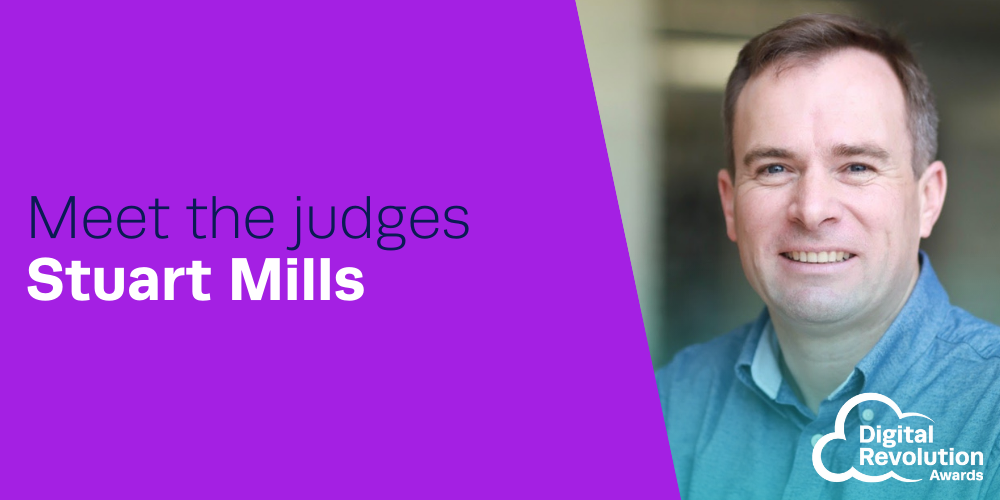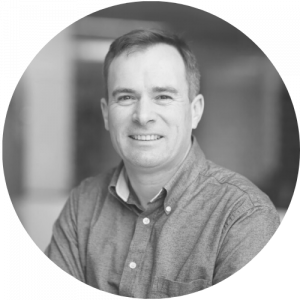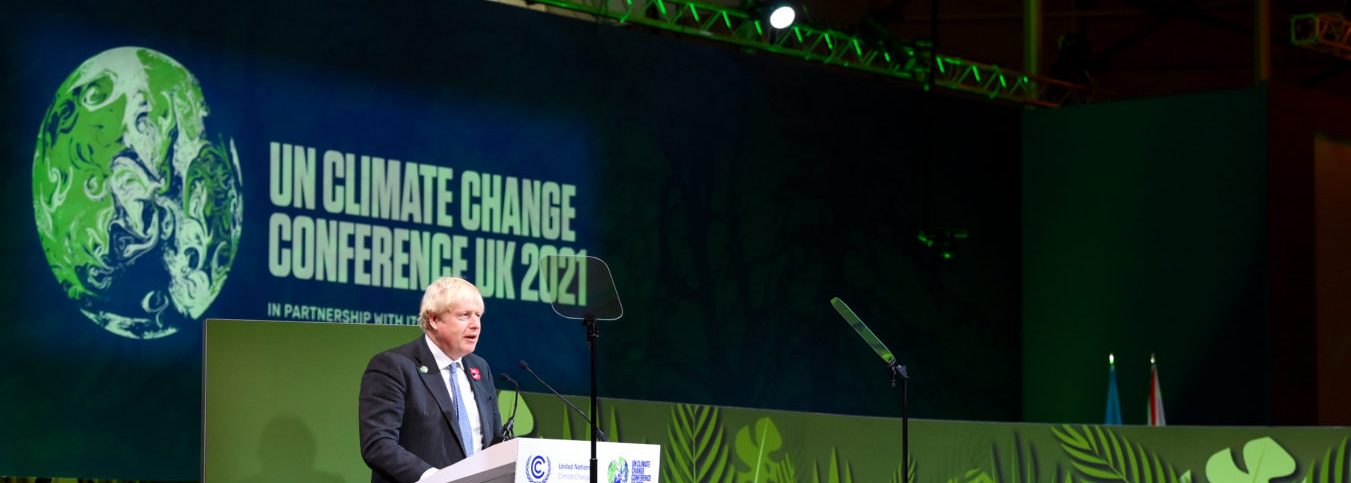
In our Meet the judges series, we’ll be chatting to some of the cloud tech experts on our judging panel to find out more about their experience, their passion for cloud tech, and what they’re making a beeline for at the awards ceremony buffet…
Stuart Mills is VP of Trailhead and Ecosystems at Salesforce.
At Salesforce, Stuart is working to build a movement for workforce development that puts diversity and equity at its heart.
He loves solving the most complex of problems and building the greatest of teams. Imagine… if we could activate the potential of everyone.
Stuart holds a MA in Aeronautical Engineering from Cambridge University and an MBA from London Business School.
I think the most exciting one for me is Tech for Good, actually; there’s a real sense that you’ve got an award that looks at how we lift the world up, and lift people up with technology and cloud technologies, particularly.
And that sort of underpins things like Diversity and Inclusion Employer of the Year. That’s a key dynamic of my role; helping in learning and development within the Salesforce ecosystem. We need people to get good work to do decent work, to quote the UN’s Sustainable Development Goals, so that idea of D&I in employment is really critical.
I’m obviously passionate about Excellence in Learning and Development too, but I think that probably Tech for Good is the one I’m most excited about seeing what people are doing.
I came across cloud technologies over 15 years ago, as a customer of Salesforce originally, and it’s had multiple impacts.
Firstly it is, in and of itself, a way of enabling my companies to excel and use technology at the rate that we needed to use it. We could continue to use a world-class system as the bedrock of what we needed, but we turned it on effectively at the rates that our business needed for us to grow.
And for me, that’s kind of the core driver of cloud technologies; they’re more accessible, and the way that data and insight is delivered directly to people is more and more fascinating.
Personally, joining the Salesforce ecosystem back then and now being at Salesforce, it’s given me a very rich career and loads of opportunity.
With cloud technology, there are lots of things to think about, whether it’s people building businesses small, medium or large, or careers that have evolved; my own career has evolved really nicely in trusting directions. It’s meant a lot on both sides, I think.
Gosh, there’s innovation all over the place. I think it’s really incredible. One of the standout organizations for me is Standard Bank. It’s an organization that has truly embraced learning as a way of life, and is always thinking about how to embrace the opportunities of cloud and platforms like Salesforce.
And then at the other end of the spectrum, we’re seeing some of the scrappy organizations that truly have worked hard, stayed inspired and alive, and looked at doing all sorts of different things. There’s loads and loads of different ones. We’re currently doing some work with the health service in Ireland, which is just truly inspiring with its work around vaccines and all of these sorts of things.

I think so. As someone once said, ‘don’t waste a good crisis’. It’s been a very challenging period, but the crisis has really brought some of the best out in people. And it’s also brought out some of the worst in people.
But in terms of organizations that we’ve seen be truly successful, it’s those that are agile, resilient, and their people are agile, resilient and learning. They’re very quickly applying that learning and that agility to market, and they’re becoming more robust and more resilient from an organizational strength perspective.
I think that while there’ve been many organizations that have not survived, the ones that have are thriving because they’ve had this agility, resilience, and continual learning environments.

I think awards are really important components. I talk a lot about ongoing learning and ongoing agility and all of these sorts of things, but every now and again we have to stop. There needs to be a milestone. In my work, that’s a reward of certification or an exam you pass or a hands-on challenge or a hackathon you do well in and deliver something on. I think rewards like these do play a critical role to lift people up and make you stop and recognize that milestone.
A lot of the reason we celebrate things, the reason we have awards or milestones, is to show the results of our work.
There’s a saying; ‘you can’t be what you can’t see’. I’m not sure I would put it that extremely. You can, but it takes a lot of hard work to be something you can’t see. So lifting people up, particularly diverse members of the community, those that have been successful in their careers or in delivering something interesting is important. Yes, it’s a statement for them, but actually, it’s also a showcase for other people to see and think ‘hmm, I could be that, I could do that, my business could do that’.
That’s why representing the diversity in technology and particularly in our space is really important.
Ethical use and ethical design of technology is a huge topic at the moment. And I think the whole area of regulation around social media and things like that will be massive. I can see that continuing to evolve and after being having more and more serious conversations around how we ethically design technology.
And that isn’t just about a platform organization like Salesforce ethically designing our platform. It’s about all of our customers and partners applying the principles of ethical design and an ethical AI, for example, in the developments that follow on the platform.
I think probably the final area is about getting back to a different world; we’re not post-covid, we’re living in an environment where we’re dealing with a pandemic and we’re living in it.
Salesforce is talking about digital HQs, about Slack and being able to do what we are doing today; working from home but being able to communicate really well and being able to bounce between one thing and the other effectively, but still build relationships.
"I think that conversation is going to continue as we work out what hybrid working means. How do I spend a day in the office, and if you're staying at home, how do I not exclude you from being part of it?"
Stuart Mills
So, I think next year will be an environment where hopefully we’ll be back together more. But I’m hoping with the sort of digital HQ mindset, we’re showing up in a way that we maximize that time together and we get back to our efficient, effective spaces online and continue to work.
I think that idea of how we work in a hybrid environment effectively is going to be a real topic of the next year, as it is already.
I was just speaking to one of our key leaders of our African business; he was based in Dublin in February, then moved to France with his family, and he’s going to continue to work in and around Africa. All he needs is a home with a good internet connection and an airport to be able to do customer visits. I think people are going to make choices, and they are already making choices, based on lifestyle.
The biggest opportunity is getting hybrid and flexible working right.
The last 18 months have been really positive in terms of investing in a different way of operating. I think that’s the opportunity; the businesses that get it right will have a digital HQ, and they’ll have a hybrid model that really works. They won’t have the retention issues that many organizations will struggle with.
On the risk side, I think we see this from two avenues. There’s a risk of the Great Resignation, and people making choices based on whether your business has kept up with working patterns that make sense, given what people have seen and experienced. But also on the flip side, people do want to get together. There’s a mental health issue on that side.

The other thing is within technology there just isn’t enough talent. This new world requires more and more digitalization, and that means there needs to be more people who are talented, and who have got the skills and experience that’s required to help with that journey. And there just isn’t enough people.
So again, I’ll use my Standard Bank example. It’s retaining employees and just continually showing up with investments in people’s skills and development. I think if we’re not doing that as organizations, then there is a real risk. That’s the real challenge. I think we all need to be ready for more economic shocks caused by the next peak in covid, in a way that’s more conscious of the challenges that we face.
Finally, as we speak, COP26 is going on in Glasgow, and I think there’ll be some great opportunities that come out of those conversations. There will also be some real challenges because this next decade is so critical. Salesforce as a business is trying to make sure we do our part in that, but we need to inspire, and have other companies and organizations join with us in doing what we can around getting to net-zero carbon emissions, and even getting to net-positive.

The first thing is obviously worrying about our own business, and we’re in that zero business now. So, we worked on how we deal with our data centers, our cloud, our offices, our flights and all of these sorts of things.
And there’s going to be a challenge to maintain that as we start to fly again; as we get back to meeting customers face-to-face and all of these things, it will increase.
So there’s a piece of this which is about our own internal footprint, and there’s an education piece which we seeing too. As an employer who stands for doing these things, we want to lead, inspiring other organizations to follow, for us to learn from them and for them to learn from us.
And then there’s the investment side of it. We’re part of the Trillion Trees organization, and we’re doing a load of work with the World Economic Forum and many other companies on initiatives like Trillion Trees to actively do something.
I suppose the final bit is about what’s underneath, almost hidden: where is our money going? Where are our pension funds and what are they invested in? We often forget that organizations as big as Salesforce and individuals like you and I have a pension that’s invested somewhere. So the question is, is it invested in good stocks, in other companies that are doing things like Salesforce is, trying to lead? It’s about making sure that we ask questions about where our money is invested.
"The focus at the moment is really thinking about how we show up properly at COP26 and what we can do to make a stand and advocate for certain things."
Stuart Mills
I use the word entrepreneur when I talk about myself quite a lot. And so, I work within large organizations like Salesforce, and I’ve been disruptive, and I look at the status quo, but I’m trying to use Salesforce to do positive things in the world. And I’m building a movement around entrepreneurship and others.
I think my day job is around trying to bring learning and education around digital techniques and skills to many people across the area in the world. And in order to do that, you have to be tenacious and entrepreneurial.
I’d love an award for entrepreneurship, where somebody can see that I don’t have quite the resources that I need to do the work, but I’ve managed to build momentum and a following, and find pockets of cash to spend, and do some amazing work in the world.
Follow the Digital Revolution Awards on Twitter for the latest news and updates.